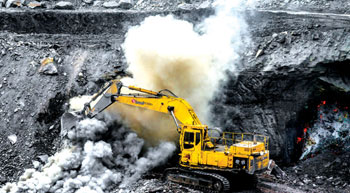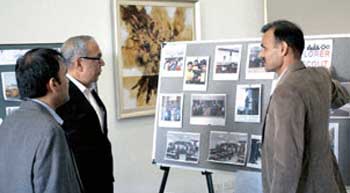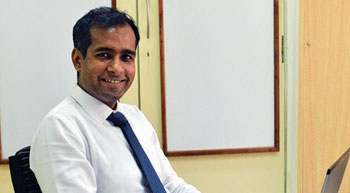Adani Ports and Special Economic Zone (APSEZ) has reported a healthy 25.82 per cent jump in consolidated net profit to Rs 849.75 crore for the quarter ended December 2016, on the back of increased income. APSEZ is the country's largest port developer and the logistics arm of Adani Group.
FlashNews:
DIAL Launches Family@DEL: First Family‑Centric Travel Initiative at an Indian Airport
India’s SDHI Lands Landmark Oman Defence Ship Deal
Air India Unveils First Line‑Fit Boeing 787‑9, Signals Bold Global Transformation in 2026
Vizhinjam Expansion Strengthens India’s Maritime Competitiveness: Sonowal
Tata Power Odisha Discoms Secure Top National Rankings for Third Consecutive Year
SDHI Secures $227 Million Chemical Tanker Deal, Revives India’s Commercial Shipbuilding
India’s Energy Transition Sets Global Pace: Pralhad Joshi at Davos
IWDC Clears ₹15 Billion Projects to Boost Green Mobility, Cargo and River Tourism
World Bank Approves $815 Million Financing for Tata Power-DGPC Dorjilung Hydropower Project in Bhutan
Indian Railways Deploys Humanoid Robot ASC ARJUN at Visakhapatnam for Smart Station Security
India’s Power Grid Crosses 500,000 Circuit Km, Marks 71.6% Growth Since 2014
India Inc Optimistic on Growth, Flags Infrastructure, Defence and Export Priorities: FICCI Survey
NHAI, Konkan Railway Ink MoU to Boost Integrated Road‑Rail Infrastructure Development
DGCA Digitises Pilot Licensing with Electronic ATPL Services to Strengthen Aviation Ecosystem
Power Minister Calls for Financially Strong Discoms to Drive India’s Energy Future
BLR Airport Launches Gate Z, India’s First Social Lounge Redefining the Airport Experience
MoPNG Highlights Financing Strength, Regulatory Reforms Ahead of New Upstream Bid Rounds
ABB India Modernises BPCL’s Vadinar‑Bina Pipeline for Uninterrupted Operations
Vaishnaw Projects 6-8% Growth, Highlights Reform Momentum at Davos
Bahri expands India presence with new Mumbai office
Bahri, a global leader in logistics and transportation, has opened a new office in Mumbai to strengthen its presence in the fast-growing Indian maritime industry and lay the foundation to offer diverse shipping services to domestic customers.
Digging Deep
In the early 1970s, the Government of India took over the management of coal mines in two tranches. The process kick-started with the nationalisation of coking coal mines in 1971-72, followed by non-coking coal mines the following year. With the enactment of the Coal Mines Act, 1973, all mines were nationalised.
Adani Institute of Infra Engineering conducts Core Infrastructure Programme
The 2nd edition of Core Infrastructure Week (CIW), the annual week long infrastructure industry engaged learning programme, organised by Adani Institute of Infrastructure Engineering (AIIE) commenced on Monday, 19th December. It continued till Friday, 23rd December.
The Digital Advantage
In the year 2007, B2C e-commerce started gaining acceptance in India. This was the year when the industry picked up pace, the common man started warming up to the idea of shopping online, and a number of start-ups came into the scene.
Click Clique
With the rise in Internet and mobile phone penetration, India has witnessed digitalisation in almost all walks of life and business. While some sectors have embraced the digital economy as the new way of life - for example, movie ticket bookings - others in the e-commerce domain like online pharmacies and grocers, are unduly taking time to make this shift.
India is a Bright Spot Amidst a Dim Global Outlook
There have been multiple evaluations of the recently launched 'Make in India' campaign and the subsequent projects that have been undertaken by the government to improve and enable the economic growth of the Indian maritime clusters. In this light, Elektrans Group is all set to further expand its footprint globally as well as within their home base in India.
Building the Blocks
The importance of quality infrastructure and the development of an economy have an umbilical cord binding them and can never be seen in isolation. Broadly, infrastructure is the network of power, telecom, ports, airports, roads, civil aviation, railways, and transportation in a country and is the lifeline of the economy of a country.
The Post GST Logistics of BIGGER WAREHOUSING
India´s burgeoning logistics and warehousing sector is set for an explosive growth trajectory, in the wake of the implementation of the Goods and Services Tax (GST) regime.
Get the Right Roof, Wall Cladding Material for your Warehouse
India has witnessed significant strides in the e-commerce business in the last few years. The logistics chains and warehousing facilities across the country are a backbone to support this e-retail and e-commerce revolution.









